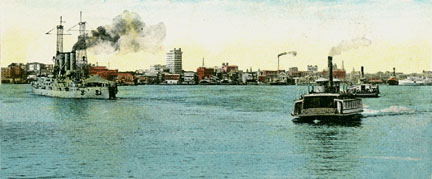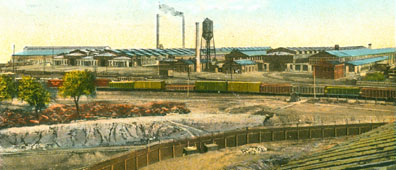
|
Keep Sweet! |
|
A Memoir by the Late Dr. Roy Sheppard Minerd - Last of 12 Parts |
Last month: Some of the boys flourish and develop beyond what they had ever imagined, including singing solos in chapel services, joining church with their parents and continuing to follow the 'keep sweet' mindset. Others, however, remain plagued by their personal demons, and do not maintain their progress.
June 2, 1917:
Another interim of a month during which other duties
prevented the continuation of this chronicle. The boys who have been on the
farms have been reported in the most flattering terms. Of McKee comes the
following from the man with whom he is staying:
"If McKee continues to learn as rapidly as he is now, he will, by the time he's 18, be able to run any farm in the state."
Saylor, Dean, Kent, Gardner and all the rest have just as fine reports. Many of the boys over 14 are working in the city and their employers speak very well of them and their training.
When I visited the Home several weeks since I was very much surprised, pleased and worried to find that "Tom" had enlisted and was then in training at the Naval Training Station at Norfolk. I was surprised because I hadn't thought of his doing such a thing; pleased because of his doing his duty by his country and also because some hard knocks and bitter experiences, such as he will get before his enlistment has expired, will help him see how his advantages at the Home and the hospital weren't so bad after all; and worried because I know of the temptations such life brings especially to one of his temperament. His only complaint is that he has to wash his own clothes, "swab decks" (too much like work) and hasn't all the money to spend that he thinks Miss S. should send him.

|
| Navy battleship in the Norfolk Harbor |
I must mention Pedrick again. Earlier, I noted that he sang as a solo the verse of a song during Chapel one morning. Knowing that I was about to leave the city permanently in a few weeks, Miss Sexton called me up a week ago and said the boys wanted to see me some evening before I left. When I went into the play room, where I hadn't met them for months, I took barely three steps before I was surrounded and batted by a howling boisterous crowd of 50 boys, each shouting a greeting and reaching for my hand -- just such a greeting as knocks the blues and makes life worth while. Pedrick was in the lead towering above the others even older than he, and not the least cordial in his welcome. After a few moments someone said: "Now take your seats and the next row go in and wash up." Everybody obeyed and when I turned to see if I heard right, I was so much pleased to see Pedrick in charge and directing affairs. Pedrick, of all fellows!
Then came the recollection of one of his grouches a few short months ago.: "They all have a pick at me. Why do they take the little fellows as monitors and leave me out? I won't be bossed by those little kids!"
To which I replied, "You show that you are worthy and capable to be trusted in taking charge of the boys and you'll get there pretty quick."
And here he was, and later Miss Sexton said, "I have rarely seen such a change in anyone as there is in Pedrick in less than a year. Instead of that nasty, hateful, irritable disposition, he has become one of my right hand men, and I can trust him at anything." -- Just another tribute to the power of an honest attempt to lead a Christian life. But still greater was my surprise when, a few minutes later, Miss Sexton came in with Pedrick, who had left the room a few minutes before, and said that Pedrick wanted to say something. All became very quiet and then in a quaint, boyish, little speech, but filled with feeling, presented to me as a token of friendship and love a beautiful military style hypodermic syringe and a set of high grade clinical thermometers, in behalf of the boys. In conclusion he said, "We cannot express our feelings, but we hope that you will accept these little gifts as a very small token of our love and esteem, and thanks for your helpfulness, your love, your advice, your interest in us and for all you have done to help us."
I was thunderstruck. I was almost puzzled to know if I was awake. I knew what I wanted to say but couldn't say it. I expressed my appreciation the best I could and urged them, as a parting thought, that they, in this great game of Life, to "play square." Then as I mentioned our separation for perhaps years or always, it became so hard to say the "Good Bye." I asked them to sing "Keep Sweet" for me once more, and then did it with a vim that seemed a welcome vent for pent up feelings, more then one blouse sleeve being drawn across eyes filled, as mine, too, were with tears. Then they had their evening prayers, closing with one we learned last summer, which is reproduced here:
|
A Boy's Prayer |
|
GIVE me clean hands, clean words, and clean thoughts; HELP me to stand for the hard right against the easy wrong; SAVE me from habits that harm; TEACH me to work as hard and play as fair in Thy sight as if all the world saw; FORGIVE me when I am unkind, and help me to forgive those who are unkind to me; KEEP me ready to help others at some cost to myself; SEND me chance to do a little good every day, and so grow more like Christ. |
|
Amen. |
Then, with a short parting prayer, we said "Good Night," and it took both my hands to receive the parting hand shake as they filed past me on their way to the dormitory.
My appreciation of their gifts was even more increased when Miss Sexton said there was no "You've got to do it" (she never does things that way) back of it, but that when it was merely mentioned and they were asked if they would like to do it, there was but one voice and that rattled the windows.
I have done so little of what I might have done, and so small a part of what I would like to have done for hem, and have sacrificed so little for their welfare, but wasn't it worth while? How it all comes back! What would or could induce me to part, if it were possible, with the friendship and good will of those motherless, fatherless boys!
The day following, my bell rang and on answering I found two of the scouts, Patterson and Chas. Saylor, in uniform, doing scout service in circulating posters concerning the purchase of "Liberty Bonds." Saylor said, "We were assigned the South district and George had his mouth organ in his pocket when we started. He pulled it out and began to play 'Keep Sweet' which made us think of you, so we decided to leave you a poster."
I had George play it again for me, which he did beautifully. When he had finished, he said "We won a game of 'Piggy' this morning by 'keeping sweet.' The others were 21 points ahead of us and we were getting pretty hot, but I remembered 'Keep Sweet' and Saylor said, 'Play Square,' and we did both, beating them by 11 points in the end."
Aug. 24, 1918:
My last entry was June 2, 1917. Today comes a letter
from Mr. Bolay, caretaker from which I quote the following:
… Ellis Pedrick is working at Baldwin's (Locomotive Works) and doing finely. He has grown into a fine young man. Tom [described earlier] has joined the navy and has been across six times. The last time, he was home they sunk a submarine and were hit by one off the coast of Ireland, but arrived safe in port.

|
|
Baldwin Locomotive Works, where Ellis Pedrick worked in 1918 |
Jan. 1919:
And then came the news that the terrible flu had
struck both Mr. and Mrs. Bolay and pneumonia with it, and while Mrs. Bolay was
just alive and no more, Mr. Bolay, "Bill," was given a promotion to
service in the presence of the Father whom he so dearly loved and served so
faithfully. He is gone but the influence of his words and his life will ever
been present in the lives of those whom he so intimately touched day after day.
Copyright © 2002 Mark A. Miner